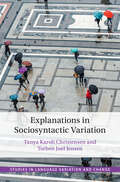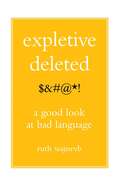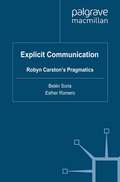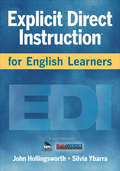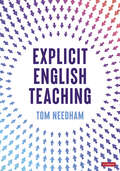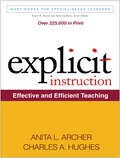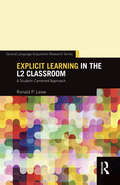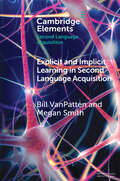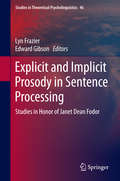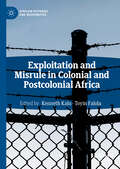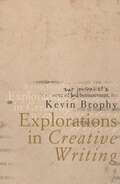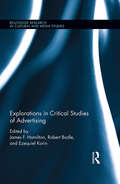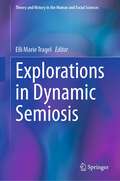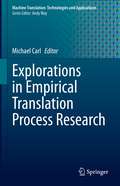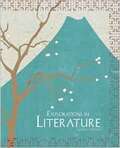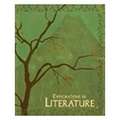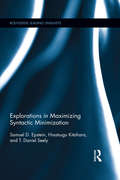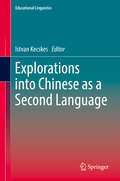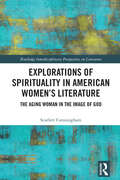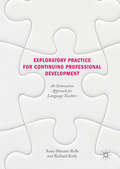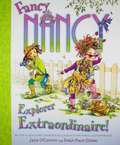- Table View
- List View
Explanations in Sociosyntactic Variation (Studies in Language Variation and Change)
by Tanya Karoli Christensen Torben Juel JensenWhat explains variation in human language? How are linguistic and social factors related? How do we examine possible semantic differences between variants? These questions and many more are explored in this volume, which examines syntactic variables in a range of languages. It brings together a team of internationally acclaimed authors to provide perspectives on how and why syntax varies between and within speakers, focusing on explaining theoretical backgrounds and methods. The analyses presented are based on a range of languages, making it possible to address the questions from a cross-linguistic perspective. All chapters demonstrate rigorous quantitative analyses, which expose the conditioning factors in language change as well as offering important insights into community and individual grammars. It is essential reading for researchers and students with an interest in language variation and change, and the theoretical framework and methods applied in the study of how and why syntax varies.
Expletive Deleted: A Good Look at Bad Language
by Ruth WajnrybHave we always "sworn like sailors"? Has creative cursing developed because we can't just slug people when they make us angry? And if such verbal aggression is universal, why is it that some languages (Japanese, for instance) supposedly do not contain any nasty words? Throughout the twentieth century there seems to have been a dramatic escalation in the use and acceptance of offensive language in English, both verbally and in print. Today it seems almost commonplace to hear the "f" word in casual conversation, and even on television. Just how have we become such a bunch of cursers and what does it tell us about our language and ourselves?InExpletive Deleted,linguist Ruth Wajnryb offers an entertaining yet thoroughly researched, lighthearted look at this development, seeking to reveal the etymologies of various terms and discover how what was once considered unfit-for-company argot has become standard fare. Wajnryb steps outside the confines of English in her search for answers, exploring whether offensive words in English are mirrored in other languages and examining cultural differences in the usage of dirty words. For instance, why is it that in some languages you can get away with intimating that a person and his camel are more than just good friends, while pouring scorn on a mother's morals guarantees you a seat on the next flight out?An amusing and idiosyncratic look at the power of words to shock, offend, insult, amuse, exaggerate, let off steam, establish relationships, and communicate deep-felt emotions,Expletive Deletedis a must-read for anyone who loves language -- or has ever stubbed a toe.
Explicit Communication: Robyn Carston’s Pragmatics
by Belén Soria Esther RomeroThis collection brings about a current interdisciplinary debate on explicit communication. With Robyn Carston's pragmatics at the core of the discussion, special attention is drawn to linguistic under-determinacy, the explicit/implicit divide and also to the construction or recruitment of concepts in on-line utterance comprehension.
Explicit Direct Instruction for English Learners
by John R. Hollingsworth Silvia E. YbarraBoost achievement for English learners in all subject areas! Building ELLs' language skills while teaching content is about to get easier. Hollingsworth and Ybarra combine the best of educational theory, brain research, and data analysis to bring you explicit direct instruction (EDI): a proven method for creating and delivering lessons that help students learn more and learn faster. Through classroom examples and detailed sample lessons, you'll learn how to: Craft lessons that ELs can learn the first time they're taught Check for understanding throughout each lesson Embed vocabulary development across the curriculum Address listening, speaking, reading, and writing in all lessons
Explicit English Teaching
by Tom NeedhamHow can you take ideas from cognitive science and explicit instruction and use them to enhance teaching and learning in your secondary English lessons? Based on contemporary research findings and supported by a range of classroom examples, this accessibly written book demonstrates how cognitive load theory, Rosenshine’s Principles of Instruction, explicit instruction and broader cognitive science ideas can be applied to the teaching of English in secondary schools. Key topics include: Explicit teaching of grammar and writing Deliberate practice to improve student writing Broadening students’ vocabularies A guide to instructional sequencing Tom Needham has been teaching for over fifteen years and currently teaches English in South London.
Explicit English Teaching
by Tom NeedhamHow can you take ideas from cognitive science and explicit instruction and use them to enhance teaching and learning in your secondary English lessons? Based on contemporary research findings and supported by a range of classroom examples, this accessibly written book demonstrates how cognitive load theory, Rosenshine’s Principles of Instruction, explicit instruction and broader cognitive science ideas can be applied to the teaching of English in secondary schools. Key topics include: Explicit teaching of grammar and writing Deliberate practice to improve student writing Broadening students’ vocabularies A guide to instructional sequencing Tom Needham has been teaching for over fifteen years and currently teaches English in South London.
Explicit Instruction: Effective and Efficient Teaching (What Works for Special-Needs Learners)
by Anita L. Archer Charles A. HughesExplicit instruction is systematic, direct, engaging, and success oriented--and has been shown to promote achievement for all students. This highly practical and accessible resource gives special and general education teachers the tools to implement explicit instruction in any grade level or content area. The authors are leading experts who provide clear guidelines for identifying key concepts, skills, and routines to teach; designing and delivering effective lessons; and giving students opportunities to practice and master new material. Sample lesson plans, lively examples, and reproducible checklists and teacher worksheets enhance the utility of the volume. Purchasers can also download and print the reproducible materials for repeated use. Video clips demonstrating the approach in real classrooms are available at the authors' website: www.explicitinstruction.org. See also related DVDs from Anita Archer: Golden Principles of Explicit Instruction; Active Participation: Getting Them All Engaged, Elementary Level; and Active Participation: Getting Them All Engaged, Secondary Level
Explicit Learning in the L2 Classroom: A Student-Centered Approach (Second Language Acquisition Research Series)
by Ronald P. LeowExplicit Learning in the L2 Classroom offers a unique five-prong (theoretical, empirical, methodological, pedagogical, and model building) approach to the issue of explicit learning in the L2 classroom from a student-centered perspective. To achieve this five-prong objective, the book reports the theoretical underpinnings, empirical studies, and the research designs employed in current research to investigate the constructs of attention and awareness in SLA with the objectives to (1) propose a model of the L2 learning process in SLA that accounts for the cognitive processes employed during this process and (2) provide pedagogical and curricular implications for the L2 classroom. The book also provides a comprehensive treatise of research methodology that is aimed at not only underscoring the major features of conducting robust research designs with high levels of internal validity but also preparing teachers to become critical readers of published empirical research.
Explicit and Implicit Learning in Second Language Acquisition (Elements in Second Language Acquisition)
by Bill VanPatten Megan SmithThis Element explores the roles of explicit and implicit learning in second language acquisition. The authors lay out some key issues that they take to underlie the debate on the extent to which second language acquisition involves explicit learning, implicit learning, or both. They also discuss what they take to be an oversight in the field: namely, the lack of clear definitions of key constructs. Taking a generative perspective on the nature of language, while addressing alternative approaches at key points, they refocus the discussion of explicit and implicit learning by first asking what must be learned (i.e., what is this mental representation we call “language” that all functioning humans possess?) The discussion and research reviewed leads to the conclusion that second language acquisition is largely if not exclusively implicit in nature and that explicit learning plays a secondary role in how learners grapple with meaning.
Explicit and Implicit Prosody in Sentence Processing
by Lyn Frazier Edward GibsonTop researchers in prosody and psycholinguistics present their research and their views on the role of prosody in processing speech and also its role in reading. The volume characterizes the state of the art in an important area of psycholinguistics. How are general constraints on prosody ('timing') and intonation ('melody') used to constrain the parsing and interpretation of spoken language? How are they used to assign a default prosody/intonation in silent reading, and more generally what is the role of phonology in reading? Prosody and intonation interact with phonology, syntax, semantics and pragmatics and thus are at the very core of language processes.
Explode the Code 1: Essential Lessons for Phonics Mastery
by Nancy Hall Rena PriceTeaches basic phonic concepts necessary for beginning reading.
Exploded Views: Speculative Form and the Labor of Inquiry
by Jonathan EburneIdiosyncratic essays use their &“exploded&” forms to examine how inquiry functions Insect galls, time, memory systems, orgone energy, and a bookstore that doesn&’t yet exist. These disparate topics have persistently fascinated scholar Jonathan P. Eburne, yet each defied his previous efforts at classification through scholarly writing, resulting in five essays suspended in process. In Exploded Views, Eburne returns to these essays with the metaphorical tool of the exploded-view diagram, expanding them into entirely new, hybrid forms that unpack their inspirations and trace the wayward paths they followed. An experiment into the nature of inquiry that spelunks, rather than shies from, the rabbit holes of scholarly curiosity, each essay gives way to sidelights and dilations to reveal the palimpsest of knowledge hiding beneath the surface of the academic form. A book about process—the process of turning ideas into things, and vice versa, as well as the particular tendency for research, scholarly inquiry, and critical writing to come apart and go awry—Exploded Views is a refreshing exploration of how the tools of creative critical thinking work at their most basic level. Reflecting on the methods of scholarly knowledge production and the contextual factors that shape new ideas, Eburne boldly replaces the seamlessness of the finished manuscript with the friction and even messiness of the incomplete, inviting readers to think in new and invigorating ways.
Exploitation and Misrule in Colonial and Postcolonial Africa (African Histories and Modernities)
by Toyin Falola Kenneth KaluThis book offers new perspectives on the history of exploitation in Africa by examining postcolonial misrule as a product of colonial exploitation. Political independence has not produced inclusive institutions, economic growth, or social stability for most Africans—it has merely transferred the benefits of exploitation from colonial Europe to a tiny African elite. Contributors investigate representations of colonial and postcolonial exploitation in literature and rhetoric, covering works from African writers such as Ngugi wa Thiong’o, Kwame Nkrumah, and Bessie Head. It then moves to case studies, drawing lines between colonial subjugation and present-day challenges through essays on Mobutu’s Zaire, Nigerian politics, the Italian colonial fascist system, and more. Together, these essays look towards how African states may transform their institutions and rupture lingering colonial legacies.
Explorations In Creative Writing
by Kevin BrophyThis set of reflective essays about the writing life examines the poetics and politics of reading as a writer, teaching and learning about writing in an academic or informal setting, and pacing oneself through writing projects. Academic investigations about the medieval concept of the writer and the novelization of the poem accompany more practical discussions about keeping a writer's sketchbook and conducting research. The growth of creative writing programs and the particular role of the artist in Australian society is explored.
Explorations in Critical Studies of Advertising (Routledge Research in Cultural and Media Studies)
by James F. Hamilton Robert Bodle Ezequiel KorinThis volume provides a thoughtful and wide-ranging exploration of approaches to the critical study of advertising. Current and impending practices of advertising have in many ways exceeded the grasp of traditional modes of critique, due at least in part to their being formulated in very different historical conditions. To begin to address this lag, this edited collection explores through critical discussion and application a variety of critical approaches to advertising. Authors address a variety of concrete examples in their chapters, drawing on existing research while presenting new findings where relevant. In order to maintain the relevance of this collection past this particular historical moment, however, chapters do not simply report on empirical work, but develop a theoretical argument.
Explorations in Dynamic Semiosis (Theory and History in the Human and Social Sciences)
by Elli Marie TragelThis anthology is a manifold combining semiotics and psychology. Chapters in the book are authored by young scholars making sense of semiosis in irreversible time from a multitude of perspectives. The central focus on the dynamics of meaning-making comes together in a variety of topics that align in the core idea of dynamic nature of human making and use of signs. First, this book gives a comprehensive overview of relational dynamics of the sign. The overview is followed by a collection of chapters focusing on various topics relevant for humanities and social sciences, such as experience of time, (cultural) memory, musical signification, human-computer interactions, death and eternity, freedom and responsibility, authenticity, methods for practice and research in psychology, etc. This anthology contributes to the integration of the fields of semiotics and psychology, building on the classic traditions of the Tartu-Moscow School of Semiotics (established by Juri Lotman) and contemporary cultural psychology that has unified social sciences in the recent three decades. Examples of how new semiotic models are applied to various domains of human lives will be given, anticipating the future and addressing its past. As such, this book is a relevant read for everyone interested in the complex nature of meaning-making, and inclusion of dynamics in all expressions of life, including academic research.
Explorations in Empirical Translation Process Research (Machine Translation: Technologies and Applications #3)
by Michael CarlThis book assembles fifteen original, interdisciplinary research chapters that explore methodological and conceptual considerations as well as user and usage studies to elucidate the relation between the translation product and translation/post-editing processes. It introduces numerous innovative empirical/data-driven measures as well as novel classification schemes and taxonomies to investigate and quantify the relation between translation quality and translation effort in from-scratch translation, machine translation post-editing and computer-assisted audiovisual translation. The volume addresses questions in the translation of cognates, neologisms, metaphors, and idioms, as well as figurative and cultural specific expressions. It re-assesses the notion of translation universals and translation literality, elaborates on the definition of translation units and syntactic equivalence, and investigates the impact of translation ambiguity and translation entropy. The results and findings are interpreted in the context of psycho-linguistic models of bilingualism and re-frame empirical translation process research within the context of modern dynamic cognitive theories of the mind. The volume bridges the gap between translation process research and machine translation research. It appeals to students and researchers in the fields.
Explorations in Literature (3rd Edition)
by Raymond A. St. John"Explorations in Literature" is divided into six units that contain a broad range of literature in a variety of genres and from varying periods. Each unit reflects a different theme: courage, nature and man, generosity, our land, humility, and family. Christian textbook.
Explorations in Literature (English 9-10)
by K12 Summit CurriculumExplorations in Literature: A language arts textbook
Explorations in Maximizing Syntactic Minimization (Routledge Leading Linguists)
by Samuel D. Epstein Hisatsugu Kitahara T. Daniel SeelyThis volume presents a series of papers written by Epstein, Kitahara and Seely, each of which explores fundamental linguistic questions and analytical mechanisms proposed in recent minimalist work, specifically concerning recent analyses by Noam Chomsky. The collection includes eight papers by the collaborators (one with Miki Obata), plus three additional papers, each individually authored by Epstein, Kitahara and Seely, that cover a range of related topics including: the minimalist commitment to explanation via simplification; the Strong Minimalist Thesis; strict adherence to simplest Merge, Merge (X, Y) = {X, Y}, subject to 3rd factor constraints; and state-of-the-art concepts and consequences of Chomsky’s most recent proposals. For instance, the volume clarifies and explores: the properties of Merge, feature inheritance and Agree; the nature of phases, cyclicity and countercyclicity; the properties of Transfer; the interpretation of features and their values and the role formal features play in the form and function of syntactic operations; and the specific properties of derivations, partially ordered rule application, and the nature of interface representations. At the cutting edge of scholarship in generative syntax, this volume will be an essential resource for syntax researchers seeking to better understand the minimalist program.
Explorations into Chinese as a Second Language
by Istvan KecskesThis volume explores how linguistic research can support the teaching and learning of Chinese as a second language. It responds to a rapidly growing interest in the Chinese language all over the world, and answers the need for a strong research background for the discipline. Without that, Chinese language learning remains only a unique experience and/or a useful education challenge. The first section explores crucial issues about the structure and use of Chinese as a Second Language such as word-order, noun-noun compounds, meaning-making in writing, pronunciation and stress and tone. The second section explores the learning of Chinese by seeking answer to questions about difficulties, expectations, beliefs, use of corpus and learning how to express necessity. The authors coming from eight different countries demonstrate how existing knowledge has been generated, bring together different lines of research, point out tendencies in the field, demonstrate and explain what tools and methods researchers can use to address major issues in the field, and give direction to what future research should focus on.
Explorations of Spirituality in American Women's Literature: The Aging Woman in the Image of God (Routledge Interdisciplinary Perspectives on Literature)
by Scarlett CunninghamThis book connects the aging woman to the image of God in the work of Flannery O’Connor, Joyce Carol Oates, Alicia Ostriker, Lucille Clifton, Mary Szybist, and Anne Babson. It introduces a canon of contemporary American women’s spiritual literature with the goal of showing how this literature treats aging and spirituality as major, connected themes. It demonstrates that such literature interacts meaningfully with feminist theology, social science research on aging and body image, attachment theory, and narrative identity theory. The book provides an interdisciplinary context for the relationship between aging and spirituality in order to confirm that US women’s writing provides unique illustrations of the interconnections between aging and spirituality signaled by other fields. This book demonstrates that relationships between the human and divine remain a consistent and valuable feature of contemporary women’s literature and that the divine–human relationship is under constant literary revision.
Exploratory Practice for Continuing Professional Development: An Innovative Approach for Language Teachers
by Assia Slimani-Rolls Richard KielyThis book explores the use of Exploratory Practice (EP) as a tool for Continuing Professional Development (CPD) by language teachers, and responds to the increasing demand for teachers to engage in research. It presents the results of a unique two-year longitudinal study that critically examines the implementation of EP by teachers of English and modern foreign languages. Through these case studies, the authors provide a critical account of EP as a form of practitioner research that bridges the divide between theory and practice. It emphasizes the centrality of teacher and learner learning in language education curriculum improvement, and gives a voice to teachers’ perspectives on using EP in the classroom. This book will be of interest to language education professionals and scholars working in Applied Linguistics and Language Education.
Explorer Extraordinaire! (I Can Read!)
by Jane O'ConnorFor the fanciest girl around, the outdoors are out of this world! Fancy Nancy and her best friend, Bree, set out to explore the fascinating world of wildflowers, trees, leaves, birds, and, of course, butterflies in their exclusively glamorous Explorers' Club.<P><P> With recipes for pinecone bird feeders and extra-fancy lemonade, an official club bird, and an exclusive map of the territory, Fancy Nancy is one Explorer Extraordinaire! Take a look at Nancy's very own enlightening discoveries and find out just how fancy the outdoors can be!
